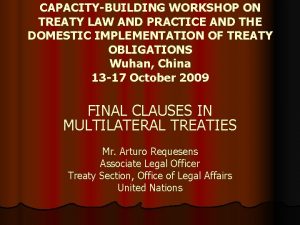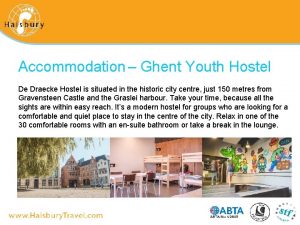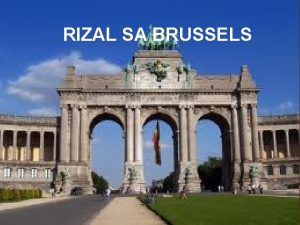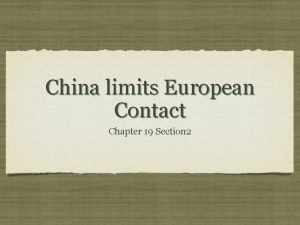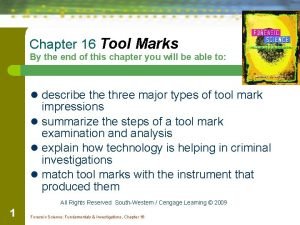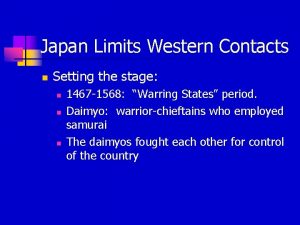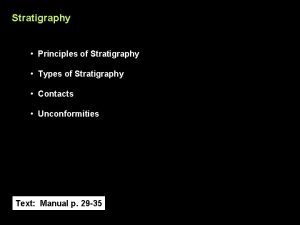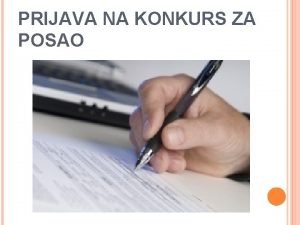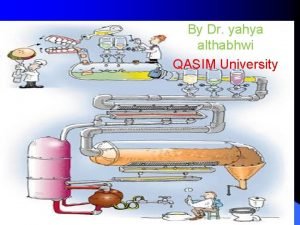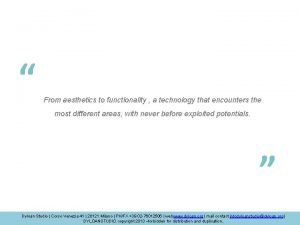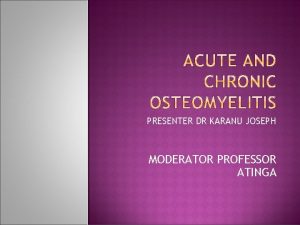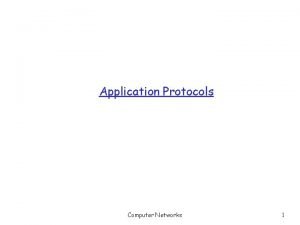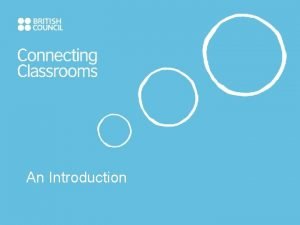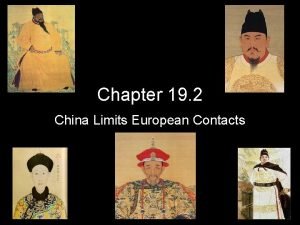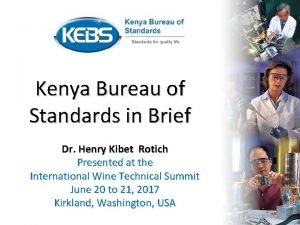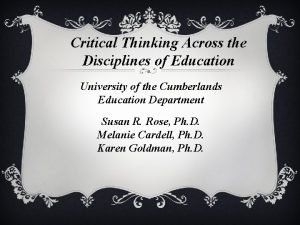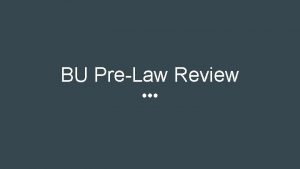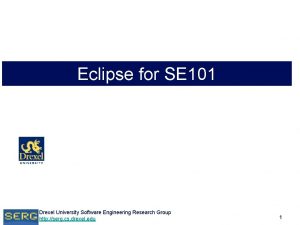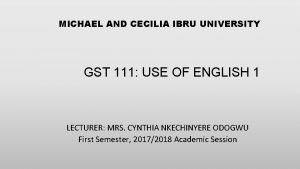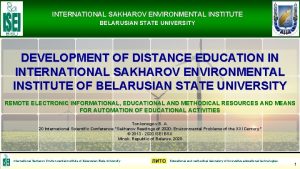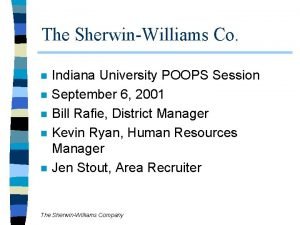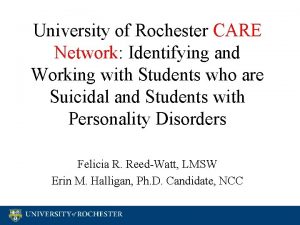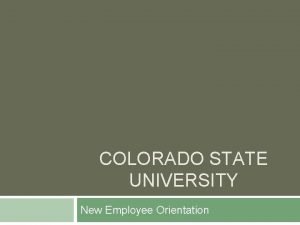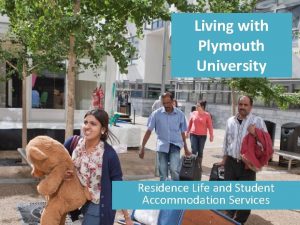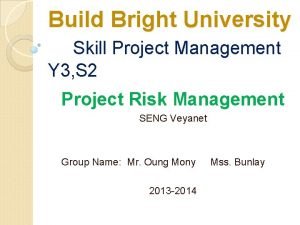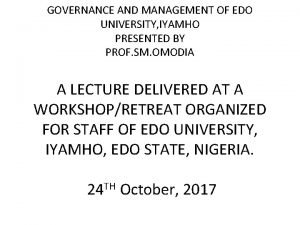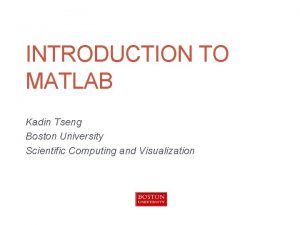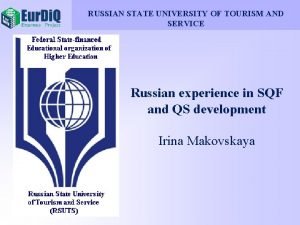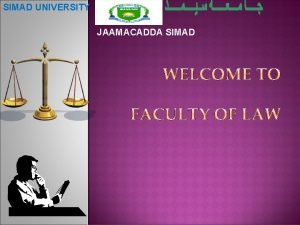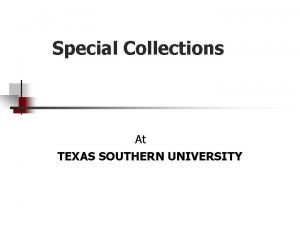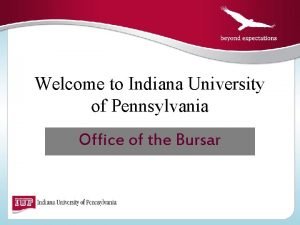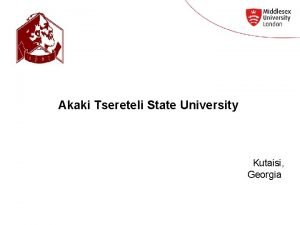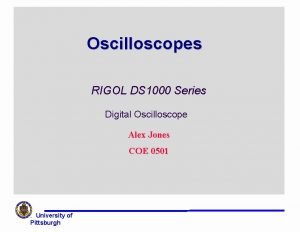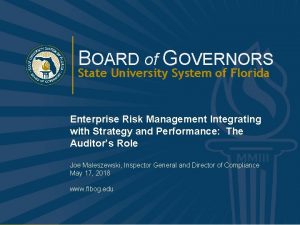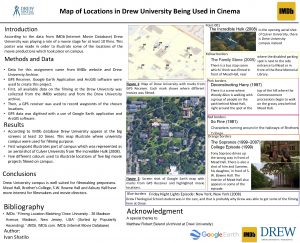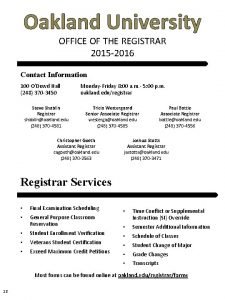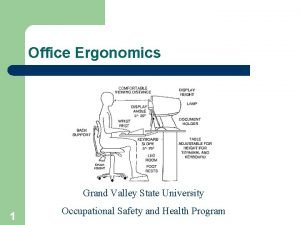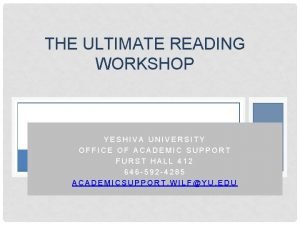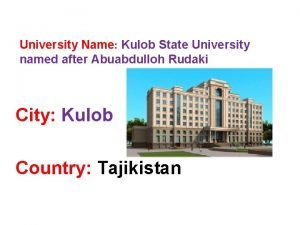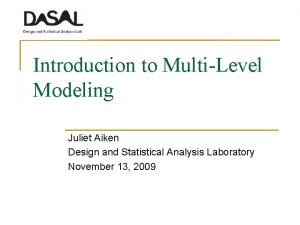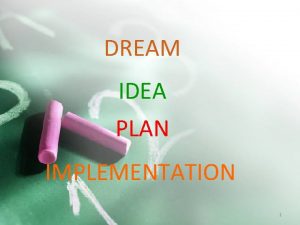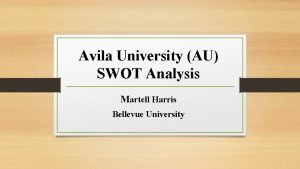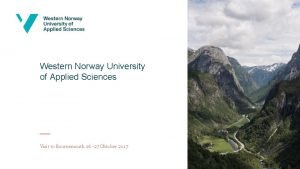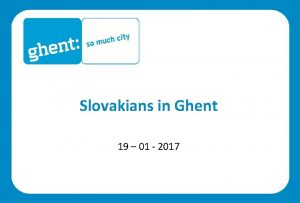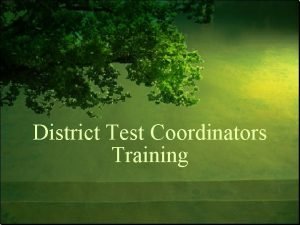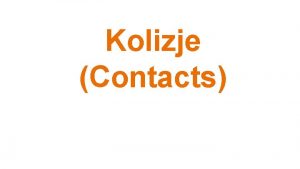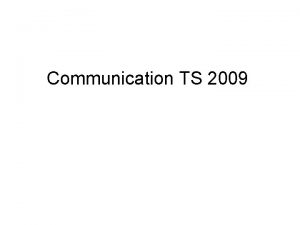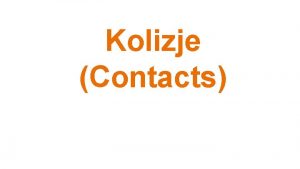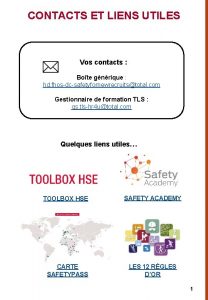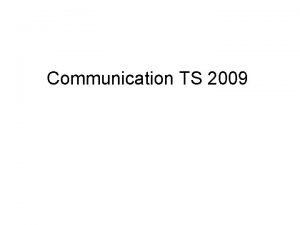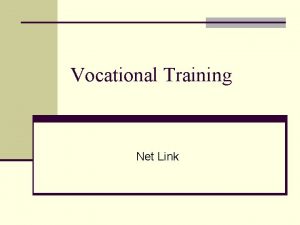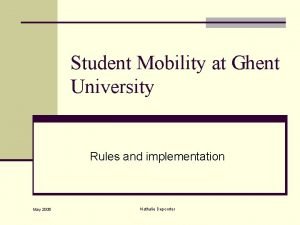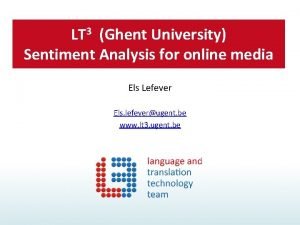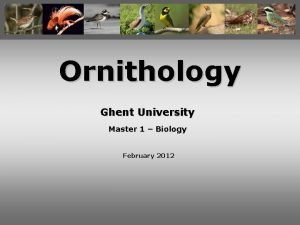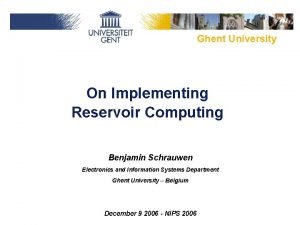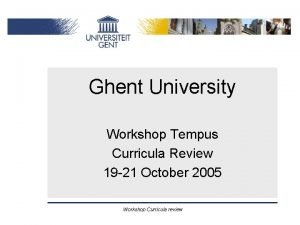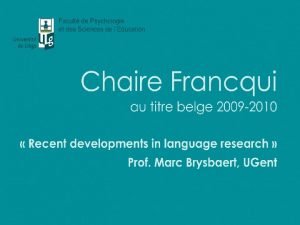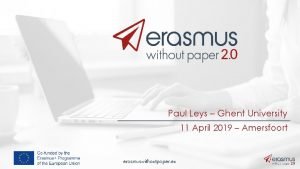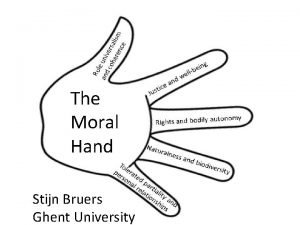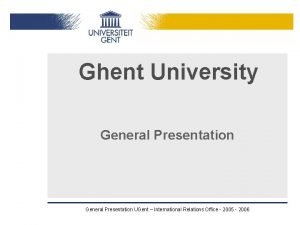EMGS Ghent University EMGS Ghent University EMGS contacts






























































- Slides: 62

EMGS @ Ghent University

EMGS @ Ghent University • EMGS contacts at Ghent University • Corona-measures in Belgium and at Ghent University • Preparing for EMGS @ UGent: to do’s, contacts and services – Pre-arrival – Upon arrival • Ghent Centre for Global Studies • EMGS 2 nd year program • Master’s thesis


EMGS contacts @ UGent • Academic seat: – Ghent Centre for Global Studies • Administrative seat: – Faculty of Political and Social Sciences – in cooperation with the Faculty of Arts and Humanities • EMGS academic contact and representative to the consortium: – Professor dr. Eric Vanhaute – Eric. Vanhaute@ugent. be – Dept. of History (Faculty of Arts & Humanities), Campus Ufo, Sint. Pietersnieuwstraat 35 • EMGS administrative contacts and coordinator: – Marissa Van Laecke, Dries Ledoux and Julie Carlier – emgs@ugent. be – Dept. of Conflict and Development Studies (Faculty of Political and Social Sciences, Campus Aula, Universiteitstraat 8)



Corona measures @ UGent • All information and updates regarding the Corona-measures in Belgium can be found here: https: //www. infocoronavirus. be/en/faq/ • All new developments and Corona-measures taken at Ghent University are communicated via https: //www. ugent. be/en/newsevents/coronavirus-updates. htm – Please be aware that the information provided in these guidelines (for example, the Welcome Days), will continuously be updated depending on how the COVID-19 crisis and Belgian government response develop • Information on how Ghent University currently organizes education during the academic year 2020 -2021 can be found here: https: //www. ugent. be/student/en/education 2021 faq. htm

Corona measures @ UGent • General policy for 2020 -2021: combining 3 key ambitions: – Safety of students and staff (physical distancing) – High-quality education (online and on campus) – UGent community (social contact and mental wellbeing) • First semester (September to January) blended learning: – Online (interactive) learning – Combined with (limited) on campus teaching activities: in small groups cf. physical distancing: classroom capacity reduced to 20% – Flexibility to move to online teaching in case of 2 nd and/or 3 rd wave • Currently, due to the second wave of COVID-19 and the government-enforced lockdown in Belgium in November and December, Ghent University has switched to exclusively online teaching

Corona measures @ UGent • What does this mean for you as an EMGS 2 nd-year student? – You are an (international) degree student at UGent • i. e. you are not an exchange student (although you do qualify for an Eramus + scholarship for the mobility from your first-year university to your second-year university) • fyi: for the purpose of the double EMGS degree you will not only be enrolled at UGent for 2021 -2022, but you will also be enrolled for 20202021 – Therefore, until further notice, you are expected on campus at the start of the academic year in September 2021 – We will update you as soon as Ghent University announces its general educational and international policy for the academic year 2021 -2022

Corona measures @ UGent • Ghent University policy for 2020 -2021 is as follows: – International degree students are expected on campus, if they can legally travel to Belgium – exceptions to the on campus rule are allowed for students: • coming from countries that are under travel restrictions • who might experience delays in the issuing of their visa – those students are asked to be on campus as soon as they legally can – in the meantime our lecturers will try to accomodate you: • by offering alternative assignments for the on campus teaching activities, • and if necessary, also a limited number of alternative online contact moments, for students who are unable to join online interactive sessions because they are living in different time zones. – Be aware that you cannot expect to be able to do your studies at Ghent University entirely online (in the same way as the on campus students) • We will inform you on Ghent University policy for 2021 -2022 as soon as this is communicated by the central administration

Preparing for EMGS @ UGent • Ghent University is currently preparing your enrolment – as a first-year for 2020 -2021 (for the purpose of the double degree) – you will receive your letter of acceptance of Ghent University asap – you will receive your student account (online ID and UGent e-mail address) via e-mail asap: you will need this account for all student admin, university services and access to online learning platforms at UGent – please note that for all administrative purposes at Ghent University EMGS students are international degree students (not exchange students) • Please read carefully the Welcome Guide for International Students of Ghent University: https: //www. ugent. be/en/administration/welcomedays/welcomeguide. pdf

To do’s, contacts and services • Pre-arrival: – Checklist for international degree students: https: //www. ugent. be/en/ghentuniv/internationalisation/lists/preparing. htm – Make sure you have adequate funding in place to support you for the duration of your stay: https: //www. numbeo. com/cost-ofliving/country_result. jsp? country=Belgium – Check immigration regulations: https: //www. ugent. be/en/administration/visa – Check your insurance status: https: //www. ugent. be/en/administration/insurances – For any question regarding immigration, visa, insurance etc. please contact the Ghent University International Support Team: international@ugent. be (with emgs@ugent. be in cc)

To do’s, contacts and services • Pre-arrival: – Visa/residence permit • All information about obtaining a visa for Belgium is available via the Federal Public Service (FPS) for Foreign Affairs and the Foreigners Department of the FPS Home Affairs. • Make sure to apply for the correct visa: you need to apply for a visa for Belgium for study purposes - for this you will need the letter of acceptance of Ghent University and Leipzig University • More information: https: //www. ugent. be/en/administration/visa • Note that you might be asked to provide a proof of sufficient financial means. For more information on how to obtain this: http: //www. ugent. be/en/administration/visa/subsistence. htm • For any question on these matters, please contact International Support Team: international@ugent. be (with emgs@ugent. be in cc)

To do’s, contacts and services • Pre-arrival: – Visa/residence permit • Students with a scholarship from a European government can be exempt from paying the administrative fee when applying for a student visa. Please add the document when applying for your visa (not afterwards because the immigration office is very strict!). • Guidelines in Dutch https: //dofi. ibz. be/sites/dvzoe/NL/nieuws/Pages/De_bijdrage. aspx • Administrative fee waiver see guidelines in English: https: //dofi. ibz. be/sites/dvzoe/EN/Applicationguides/Pages/Administrative%20 fee. aspx • Please add the English document Bourse attestation to you visa application.

To do’s, contacts and services • Pre-arrival: – Funding / scholarships • On living standards and cost of living in Belgium: http: //www. ugent. be/en/facilities#Costoflivingin. Belgium • An overview of UGent funding possibilities and/or scholarship programs can be found here: https: //www. ugent. be/en/education/degree/practical/studentad min/funding-studies. htm

To do’s, contacts and services • Pre-arrival: – Funding / scholarships – 3 rd semester mobility • See Faculty webpage on outgoing exchange students – see rubric on “Exchange abroad for Master Global Studies”: https: //www. ugent. be/ps/en/education/internationalrelationsoffice/exch ange-abroad-for-degree-students. htm • Please contact International Relations office of the Faculty rio. psw@ugent. be - before February 20, if you wish to apply for a scholarship for 3 rd semester mobility - deadline for applications: March 4 – Online Oasis exchange application + application for scholarship – UGent International Relations Office – exchanges & scholarships: https: //www. ugent. be/student/en/class-exam-exchange-intern/exchangeugent-students/bilaks. htm – Note: UGent might foresee a second call for funding - deadline in August. September 2021 for outgoing exchanges – will also be announced on https: //www. ugent. be/student/en/class-exam-exchange-intern/exchangeugent-students/bilaks. htm

To do’s, contacts and services • Pre-arrival: – Accommodation: University Halls of Residence: • See: https: //www. ugent. be/en/facilities/housing – – – – We offer short stay possibilities. The rental fees are lower than the ones on the private market. The use of electricity, water, internet, . . . is included in the rental fee. The deposit fee is limited. Furniture is provided. Facilities: a common room, a study hall, a bicycle park and a laundry room. 24/7 on-site support. • Application for a room, via Housing Office: https: //www. ugent. be/en/facilities/housing/accomodation – Application for the academic year 2021 -2022 opens in March – apply asap – Apply as Erasmus Mundus Master Course Students – If you have any problem with the online application on Oasis, please contact: huisvesting@ugent. be or admission@ugent. be (with emgs@ugent. be in cc)

To do’s, contacts and services • Pre-arrival: – Accommodation: rooms are increasingly scarce – for a room in a University Residence Hall – apply in time (March!) – Private housing: see website of the city council of Ghent: https: //stad. gent/en/internationalstudents/living/accommodation/find-room/private-housing – Online search directory for private rooms (“kot”): kotatgent. be: https: //kot. gent. be/koten/lijst – Suggestion: contact current Ghent University EMGS students via their representatives to check if you could take over the contract for their student rooms on the private market: • First-year student representatives: Marcus. Loiseau@UGent. be, Annika. Maurer@UGent. be • Second-year student representatives: mariama. diallo@ugent. be, Ruben. Janze. Lindberg@UGent. be

To do’s, contacts and services • Pre-arrival: – Health insurance • Health insurance is of the utmost importance because medical costs may occur unexpectedly and can be very high in Belgium. • Students from the European Economic Area (EEA) and Switzerland are insured by their homeland medical insurance company during their stay in Belgium. Make sure to do the required paperwork! http: //ec. europa. eu/social/main. jsp? cat. Id=509&lang. Id=en • Students from outside the European Economic Area (non-EEA) except Switzerland, or students without a European health insurance card have to take out insurance. Make sure to take out insurance!!! https: //www. ugent. be/en/administration/insurances/students. htm

To do’s, contacts and services • Arrival: – You will be registered as a first-year student for 2020 -2021 (cf. upcoming letter of acceptance) • You will get a student account which will be sent to you via e-mail • Go to http: //Oasis. Ugent. be and log in with your UGent account to complete your student administration: – Update personal data: as soon as you have an address (the housing until the end of your stay in Ghent), you need to input this in Oasis. – Upload a passport picture (mandatory for your student card) – The Admission service will re-enrol you for 2021 -2022 as soon as we receive the grades / credits from your first year and then: • you will be able to download your certificate of enrolment from http: //Oasis. Ugent. be

To do’s, contacts and services • Arrival: – Timing: • Start of the academic year 2021 -2022: Monday September 27 • Ghent University Academic calendar: https: //www. ugent. be/current-students/en/class-exam-exchangeintern/class-exam/academiccalendar • Suggested arrival date: Monday September 20 • EMGS Introduction Day: Wednesday September 22 (tbc) • Ghent University Welcome Days for International Students (dates tbc): https: //www. ugent. be/en/administration/welcome-days

Academic calendar (dates tbc) First semester – Fall term • Suggested arrival date: September 20 • Start of the academic year: September 27 • 12 weeks of classes • 1 week of catch-up classes • Christmas recess: 2 weeks: 27 December 2021 – 9 January 2022 • 1 st examination period – 1 st semester: 4 weeks in January • Interterm recess – 1 week in early February Second Semester – Spring term • Suggested arrival date (3 rd sem mobility): early February (tbc) • Mid-February: 8 weeks of classes • Easter recess: 2 weeks 4 to 17 April 2022 • 4 weeks of classes • 1 week of catch-up classes • Master thesis deadline 1 st examination period: mid-May • 1 st examination period – 2 nd semester: 6 weeks end of May and month of June Summer – 2 nd examination period • Master thesis deadline: early August (no resubmission possible) • Resit exams: 4 weeks second half of August and first half of September • End of the academic year: 25 September 2022

To do’s, contacts and services • Upon arrival: – During the EMGS Introduction Day • You will receive – your student ID card (for all university services, including student restaurants and libraries), provided you have uploaded a picture on Oasis • We will introduce to you: – the program and the lecturers and we help you to select the electives (online registration of your curriculum) – there is no limit to the number of students per course, no need to enroll early – the faculty, the campuses and university services

To do’s, contacts and services • Upon arrival: – Registration at the Migration Office of the City of Ghent • All international students have to report to the Migration Office of the city of Ghent. You are required to start your application for a residence permit at the Migration Office online, within 8 workdays upon arriving in Ghent. • All information about the different procedures can be found on the following webpage: https: //stad. gent/en/internationalstudents/paperwork-administration/your-arrival-ghent/registrationcity-application-residence-document-and-renewal-residencedocument • For any question, please contact the city’s Migration office: internationalstudent@stad. gent • You will be provided with more information on how to register at the Migration Office during the University Welcome Days for International Students (in September – dates tbc)

To do’s, contacts and services • Important contacts: – Registrar’s Office: Ms. Lieselot Odou • Enrolment • Ufo-building, Campus Ufo, Sint-Pietersnieuwstraat 33 • admission@ugent. be – Faculty Student Administration: Ms. Marissa Van Laecke • Enrolment, curriculum, course and exam schedules etc. • Faculty of Social and Political Sciences, Campus Aula, Universiteitstraat 8 • emgs@ugent. be / Marissa. Van. Laecke@ugent. be – Faculty Internationalisation Office: Mr. Dries Ledoux • Erasmus + exchange and learning agreements, and 3 rd semester mobility • Faculty of Social and Political Sciences, Campus Aula, Universiteitstraat 8 • Dries. Ledoux@ugent. be / rio. psw@ugent. be – International Support Team of Ghent University: • Questions re visa, proof of sufficient financial means, bank account, insurance, residence permit, etc. • international@ugent. be – Put the EMGS coordinators in cc of your communication to other university services, please: • emgs@ugent. be


To do’s, contacts and services • Ghent University services for students – University and city life, see: https: //www. ugent. be/en/facilities • • Student restaurants Sports facilities Bicycle rent and repair … – Student medical service – general physicians: https: //www. ugent. be/current-students/en/study-support/medical – Student counselling (incl. mental health support in case of stress and/or social isolation): https: //www. ugent. be/currentstudents/en/study-support/counselling


EMGS @ Ghent University • EMGS program committee at Ghent University: – Professors / lecturers: • • Prof. dr. Dries Lesage – Political Sciences: International Studies Prof. dr. Glenn Rayp – General Economics Prof. dr. Eric Vanhaute – History Prof. dr. Koen Vlassenroot – Political Sciences: Conflict and Development Studies – Postdoc academic staff / lecturers: • dr. Julie Carlier – Conflict and Development Studies • dr. Sarah Delputte – Political Sciences: EU Studies • dr. Julian Kuttig – Conflict and Development Studies – Student representatives – for 2020 -2021: • First-years: Marcus Loiseau and Annika Maurer • Second-years: Mariama Diallo and Ruben Janze

www. globalstudies. ugent. be Coordination and contact: Julie Carlier Dept. of Conflict and Development Studies, Ghent University Universiteitstraat 8, 9000 Gent, BELGIUM Julie. Carlier@ugent. be

• Ghent University: interdisciplinary research platform – Launched in 2013 as 1 of 5 spearheading platforms in Social Sciences and Humanities – Consolidated as from 2018 as 1 of 10 interdisciplinary research consortia focused on social impact • Interdisciplinary: 9 research groups – 6 faculties – World History; European Studies; International Studies; Conflict & Development Studies; Economics; Global Ethics; Migration Studies; Human Rights Law; Architecture & Urban Planning

Mission • Critical & reflexive study of: – contemporary and historical globalisation processes – with special attention to the interaction and co-construction of the global and the local • With its interdisciplinary research & education the Centre aims: – to develop knowledge as a tool for global social change – and to contribute to the public debate on the transition towards a sustainable economy on a human scale. – to this end, the GCGS also collaborates with civil society organisations, policy-makers and the arts

Research clusters • Migration, borders & mobilities • Nature, resources & land: political ecology & commodity frontiers • Margins, property & space: inequality & citizenship • Global governance & social movements: rule & resistance


Research groups CEVI: Centre for Ethics and Value Inquiry – Global Ethics (Philosophy) CEUS: Centre for EU Studies (Political Science) CRG: Conflict Research Group (Conflict & Development Studies) ECC: Economies, Comparisons and Connections (History) GIIS: Ghent Institute for International Studies (Political Science) HRC: Human Rights Centre (Public Law) ITIM: International Trade, Investment and Migration (General Economics) MENARG: Middle East and North Africa Research Group (Conflict & Development Studies) • Dept. of Architecture and Urban Planning • •

Partners - networks UGENT-based • CESSMIR: Centre for the Social Study of Migration and Refugees • Gi. C network: Governance in Conflict (international research network) • Commodity Frontiers Network (international research collective) EXTERNAL • EADI: European Association of Development Research & Training Institutes • TNI: Transnational Institute (Amsterdam) • MO*Magazine – Dutch-language independent online media outlet on world news, globalisation, development cooperation and migration • 11. 11: Flemish umbrella organisation for North-South Solidarity organisations (NGO’s) • …

EMGS @ UGent PROGRAM AT A GLANCE: MODULES First year https: //studiegids. ugent. be/2020/EN/FACULTY/K/MABA/KMEMGS. html (First Mt 1 year + course schedule per semester) 1. 2. 3. 4. 5. 6. Introduction to Global History and Global Studies Global governance and Global Justice Conflict and Development in a Globalizing World I History and Political Economy of Global Capitalism Europe as a Global Actor EMGS Joint Winter and Summer School

EMGS @ UGent PROGRAM AT A GLANCE: MODULES Second year https: //studiegids. ugent. be/2020/EN/FACULTY/K/MABA/KMEMGS. html (Second Mt 1 year + course schedule per semester)* 7. 8. 9. 10. 11. 12. Global History: Europe and the World Societies: Perspectives from the Global South II Conflict and Development in a Globalizing World II Advanced Research Seminar in Global Studies Master Thesis

nd 2 year EMGS program First semester • Module 7 – Global History: Europe and the World choose 2 out of the following 3 electives – History of Globalisation – History of European expansion in the early modern period – Research Seminar World History

nd 2 year EMGS program First semester • Module 8 – World Societies: Perspectives from the Global South I 10 ECTS – choose 2 out of the following 6 electives (5 ECTS each) (other than the ones selected in module 9) – – – Research Seminar African History Poverty, development and inequality in Modern African History Conflict and Society in Central and Eastern Africa Contentious Politics in North Africa Popular Politics and Technopolitics in the Middle East State and Society in Asia

nd 2 year EMGS program First semester • Module 9 – World Societies: Perspectives from the Global South II 10 ECTS – choose 2 out of the following 6 electives (5 ECTS each) (other than the ones selected in module 8) – – – Research Seminar African History Poverty, development and inequality in Modern African History Conflict and Society in Central and Eastern Africa Contentious Politics in North Africa Popular Politics and Technopolitics in the Middle East State and Society in Asia

nd 2 year EMGS program First semester: • Module 10 – Conflict and Development in a Globalising World II 10 ECTS – 2 electives in sem 1 (6 electives in sem 2) – Urbanisation in a Global Perspective – Transnationalism and migration

nd 2 year program Second semester: • Module 10 – Conflict and Development in a Globalizing World II – 10 ECTS – choose 2 out of the following 9 electives (5 ECTS each) – – – – – (Urbanisation in a Global Perspective – Sem 1) (Transnationalism and Migration – Sem 1) Human Rights in Developing countries Gender and globalisation Postcolonial Studies Political Ecology Sustainable Development Rural Sociology Politics of Islam

nd 2 year program Second semester: • Module 11 – (Master dissertation II) Advanced Research Seminar Global Studies – 5 ECTS – Global Studies Research Seminar – themes and methodologies – Thesis tutorials • Module 12 – (Master dissertation III) Master’s thesis – 15 ECTS

Master’s thesis • post-grad work: your own individual research project: original research • demonstrate familiarity with the state of the art in the academic debates in Global Studies • demonstrate ability for academic research, both with regard to interpreting the (secondary) literature but, in many cases, also analysing (primary) sources • Presented in a scientifically sound / academic text (verifiable references to literature and sources, correct citations etc. )

Master’s thesis Timeline • Summer School July 2021: thesis workshop – discussion and exploration of ideas for thesis topics with second-year university lecturer(s) – suggested potential supervisors • • Early November 2021: official registration of your thesis topic and supervisor Winter 2021/2022: exposé or research outline of 3000 words – structure: 1) state of the art; 2) research question; 3) sources; 4) method / theory; 5) draft table of contents; 6) bibliography (10 most important books – articles) – 1 st draft; by the beginning of December 2021; hand-in of final outline early February 2022 • Deadlines submission Master’s thesis: – 1 st examination period at Ghent University: May 2022 (date tbc) – 2 nd examination period at Ghent University: August 2022 (date tbc)* *i. e. resit deadline – if you do not submit or fail at this time, you cannot graduate and will need to take on an additional semester at Ghent University (deadline for submission in December 2022, graduation no earlier than February 2023)

Master’s thesis Lecturers and potential supervisors at Ghent University: • • Eric Vanhaute – History – Eric. Vanhaute@ugent. be – Expertise: world history; socio-economic history; capitalist expansion; peasant studies; commodity frontiers – Suggested topics: historical, comparative research on: capitalism, commodity frontiers and rural transformations; peasants and peasant movements; access to and land reforms; development and global inequality; business expansion Michael Limberger – History – Michael. Limberger@ugent. be – Expertise: Social and Economic History of the late Middle Ages and the early Modern period, History of European colonialism 1500 -1800, Maritime History – Suggested topics: A comparative study of the living standard in different parts of the world via the study of travel literature; Encounters, interactions and perception between Europeans and non-Europeans during the Early Modern period; Cities and urban networks in the early modern period; Global commodity flows in the early modern world (production – trade – consumption of precious metals, textiles, spices, sugar…); The development of port cities and port networks – case studies

Master’s thesis Lecturers and potential supervisors at Ghent University: • • • Felicitas Becker – History - Feli. Becker@ugent. be – Expertise: (post)colonial history of Eastern Africa, development, politics religion – Suggested topics: cf. expertise but focused on one case or issue Frank Caestecker – Economics – Frank. Caestecker@ugent. be – Expertise: history of migration and migration policies 19 th and 20 th Centuries – Suggested topics: immigration and/versus refugee policy in Europe from 1975 onwards, refugee determination process, attitude towards war refugees, persecution in the private sphere (gender, LGBTQI+), nationality acquisition. Glenn Rayp – Economics – Glenn. Rayp@ugent. be – Expertise: international economics, trade, investment and migration – Suggested topics: economic globalisation and inequality, international trade and investment, migration and economic development

Master’s thesis Lecturers and potential supervisors at Ghent University: • • Dries Lesage – Political Science – Dries. Lesage@ugent. be – Expertise: international politics; global governance; multilateralism – Suggested topics: Trump and the multilateral architecture (trade, climate, security, …); The implementation of the Sustainable Development Goals (monitoring, peer review); New developments in the global trading architecture; Governance reform at the IMF/World Bank; Policy reform at the IMF/World Bank; Towards a more robust global regime for refugees and migrants? ; New developments in global health governance; The relevance of BRICS Thijs Van de Graaf – Political Science – Thijs. Vande. Graaf@ugent. be – Expertise: global energy politics; climate policy; energy security – Suggested topics: The geopolitics of the energy transition; Anti-fossil fuel activism and norms; Global climate governance after Paris; The global politics of oil and natural gas (indicative list only)

Master’s thesis Lecturers and potential supervisors at Ghent University: • • Sven Biscop – Political Science – Sven. Biscop@ugent. be – Expertise: EU, external action, EU common foreign and security policy, EU-US-China. Russia relations – Suggested topics: Grand Strategy, the great powers, and the place of Europe/the EU in a multipolar world; the EU Global Strategy; European defence; transatlantic relations and NATO; the EU and the Middle East and North Africa. Fabienne Bossuyt – Political Science – Fabienne. Bossuyt@ugent. be – Expertise: EU foreign policy, EU policies towards the post-Soviet space – Suggested topics: European Neighbourhood Policy; EU policies towards the post-Soviet space (Russia, the Eastern Partnership countries, and Central Asia)

Master’s thesis Lecturers and potential supervisors at Ghent University: • • Sarah Delputte – Political Science – Sarah. Delputte@ugent. be – Expertise: European and international ‘development’ policies, EU-Africa relations – Suggested topics: Africa-EU relations; EU policies towards and relations with the Global South; EU and international ‘development’ policy & politics and its interlinkages (‘nexuses’) with other external policies, including climate change, trade and migration; bridging EU ('development') studies and post-development (diversity of ‘development’ views in Europe, paradigm change and continuity); the role of populism in challenging the hegemonic ‘development’ consensus Jan Orbie – Political Science – Jan. Orbie@ugent. be – Expertise: Europe as a global actor, trade, (post-)development and human rights – Suggested topics: The soft dimension of EU external policies: trade policy, development policy, humanitarian policy, civil society support, democracy promotion, human rights promotion

Master’s thesis Lecturers and potential supervisors at Ghent University: • • • Jeroen Adam – Conflict and Development Studies – Jeroen. Adam@ugent. be – Expertise: Southeast Asia, rural sociology, conflict and peacebuilding, natural resources – Suggested topics: New authoritarianism/violent democracy in Southeast Asia; Land grabbing and land dispossession; Peacebuilding interventions: rationalities, discourses… Bert Suykens – Conflict and Development Studies – Bert. Suykens@ugent. be – Expertise: Governance in conflict, (political) violence and public authority, non-state armed actors, violence and democratic politics, focus on Bangladesh, India, Nepal – Suggested topics: cf. expertise but focused on one case or issue Julian Kuttig – Conflict and Development Studies – Julian. Kuttig@ugent. be – Expertise: populism, political violence, patronage politics, performative politics, political subjectivity, student politics, strongmen politics, Bangladesh, Turkey, Uganda – Suggested topics: cf. expertise but focused on one case or issue

Master’s thesis Lecturers and potential supervisors at Ghent University: • Bernard Mazijn – Conflict and Development Studies –Bernard. Mazijn@ugent. be – Expertise: sustainable development; sustainable consumption and production; life cycle sustainability assessment; monitoring and evaluation; natural resources; technology (transfer); SDGs – Suggested topics: Theme ‘Rio+20 – United Nations Conference on Sustainable Development’ (Topics: What about the interlinkages between SDGs/Targets? Confronted with the worldwide challenges, how SDG/Targets should have been defined? Regarding the two results of UNCSD: where are we? ); Theme ‘Towards a circular economy’ (Topics: What about biomass? What about the (rare) (earth) metals? Consequences for the Western countries/the Global South: the case of an LDC. ); Theme: ‘What are sustainable products in relations to social considerations (cf. social LCA)? ’ (Topics: Translating data from ‘life cycle impact’ (LCI) towards impact on the society. Usability of generic ‘hotspot’ databases. Application of the guidelines on a case study. Use of the results of a social LCA in policymaking/strategy development. )

Master’s thesis Lecturers and potential supervisors at Ghent University: • • • Marlies Casier – Conflict and Development Studies – Marlies. Casier@ugent. be – Expertise: transnationalism & diaspora politics, state-society relations, non-state armed actors, Turkey, Kurdish issue, rebel governance, advocacy in conflict and development, sexual and reproductive health and rights – Suggested topics: cf. expertise, but focused on one case or issue Julie Carlier – Conflict and Development Studies – Julie. Carlier@ugent. be – Expertise: gender and globalisation, transnational history, feminism, intersectionality, gender studies, social movements / transnational civil society – Suggested topics: cf. expertise, but focused on one case or issue Sigrid Vertommen – Conflict and Development Studies – Sigrid. Vertommen@ugent. be – Expertise: gender and globalisation, reproductive turn, global reproductive chains, biopolitics, bio-economy and the political economy of assisted reproduction, gender and sexual politics, Palestine, settler colonialism – Suggested topics: cf. expertise, but focused on one case or issue

Master’s thesis Lecturers and potential supervisors at Ghent University: • • Koen Vlassenroot – Dept. of Conflict and Development Studies – Koen. Vlassenroot@ugent. be – Expertise: political economy of conflict, non-state armed actors, processes of identity formation, land-access, food security, Central Africa – Suggested topics: cf. expertise but focused on one case or issue Esther Marijnen – Esther. Marijnen@ugent. be – Expertise: Political Ecology, politics of nature conservation/ natural resources; critical conflict studies; Great Lakes region – Suggested topics: colonial legacies in nature conservation, conflicts around access and (re)distribution of natural resources (forest, fisheries, etc. ); the militarisation of conservation; role of international donors and/or the effects of these policies; the politics of oil exploitation in the Great Lakes region

Master’s thesis Lecturers and potential supervisors at Ghent University: • • • Brecht De Smet – Conflict and Development Studies – Brecht. De. Smet@ugent. be – Expertise: social movements, revolution and contentious politics in the Middle East and North Africa (focus: Egypt), globalisation and political change in the region – Suggested topics: cf. expertise, but focused on one case study or topic Christopher Parker – Conflict and Development Studies – Christopher. Parker@ugent. be – Expertise: Institutions and conflict/collective action; globalization and the realignment of politics; Middle East politics and society, relational approaches to power and change – Suggested topics: assemblages of neoliberal globalisation; e. g. urban planning in the Middle East; (eco-)tourism; geographies and infrastructures of globalisation Sami Zemni – Dept. of Conflict and Development Studies – Sami. Zemni@ugent. be – expertise: social protest and contentious politics, Arab politics, Tunisian revolution, Politics of Islam, Salafism, politics of resistance, Islam in Europe – Suggested topics: cf. expertise above, focused on one case or issue

Master’s thesis Lecturers and potential supervisors at Ghent University: • • Koenraad Bogaert – Dept. of Conflict and Development Studies – Koenraad. Bogaert@ugent. be – Expertise: political change in the Arab World in relation to globalization, neoliberal urbanization, (urban and rural) social movements, revolution, governmentality, decolonial thought, history of colonialism, imperialism and slavery, post-development – Suggested topics: cf. expertise above, focused on one case or issue Yves Haeck – European, Public and International Law – Yves. Haeck@ugent. be – Expertise: human rights law; European Convention on Human Rights and the European Court of Human Rights, with a comparative focus on the Inter-American System and other regional systems; human rights in developing countries – Suggested topics: cf. expertise but focused on one case or issue

Master’s thesis How to choose a theme / topic? • Inspiration from the list of suggested topics of the supervisors above • Or: own interests (needs to tie in with expertise at Ghent University) • Exploratory literature review: – – What has already been researched? Where are the blind spots – hiatuses? What are the key perspectives, approaches, debates re this topic? Which sources can you use? • Distill possible basic topics: case study; main research question; main approach • For thesis workshop at the Summer School in July 2021: you can still propose more than one possible thesis topic – informal / exploratory!

Master’s thesis Make sure to develop a Global Studies approach: • relate your thesis to the Global Studies program and approach • Think about: what makes my thesis different from a traditional history, IR etc. thesis? – transnational entanglements – comparative perspectives – relational perspective: • Temporal dimension: historicity • Spatial dimension: co-construction of the local and the global – reflexive reasoning (i. e. avoiding methodological nationalism and conceptual Eurocentrism)

Master’s thesis Make sure to develop a Global Studies approach: • • transnational: focused on the analysis of ideas, processes, events, activities, trends, processes, flows and phenomena that appear across national boundaries and cultural regions; (See also Ghent Centre for Global Studies: spatial turn: interaction of scales – coconstruction of the local and the global) Interdisciplinary: global phenomena are of economic, political, cultural, social, religious, ideological, biological nature and can not be explained from the perspective of one discipline only. both contemporary and historical: the contemporary patterns of globalization can be fully understood only by proving their historical precedents. postcolonial and critical: critical examination of eurocentric approaches and academic imperialism, the comparative perspective and the use of term many globalizations acknowledges that there is no dominant paradigm or perspective in global studies that is valued over the others. Read more in the article of Mark Jürgensmeier. „What is Global Studies“ (http: //global-ejournal. org/2011/05/06/what-is-global-studies-3/)

Master’s thesis Make sure to develop a Global Studies approach • Suggested reading: Eve Darian-Smith & Philip Mc. Carthy (2017) The Global Turn. Theories, Research Designs and Methods for Global Studies. Oakland: University of California Press. The ability to deploy interdisciplinary theoretical perspectives that speak to interconnected global dimensions is critical if one’s work is to be relevant and applicable to the emerging global-scale issues of our time. The Global Turn is a guide for students and scholars across all areas of the social sciences and humanities who wish to embark on global-studies research projects. The authors demonstrate how the global can be studied from a local perspective and vice versa. They show global processes manifest at multiple levels—transnational, regional, national, and local—all of which are interconnected and mutually constitutive. This book takes readers through the steps of thinking like a global scholar in theoretical, methodological, and practical terms, and it explains the implications of global perspectives for research design.

Coordination & contact Eric Vanhaute (academic head of the program at UGent) Julie Carlier (program coordination) Marissa Van Laecke (student administration) Dries Ledoux (E+ exchange & 3 rd sem mobility administration) Ghent University Faculty of Political and Social Sciences Dept. of Conflict and Development Studies Campus Aula, Universiteitstraat 8, 9000 Ghent, BELGIUM emgs@ugent. be
 Treaty of ghent summary
Treaty of ghent summary Hi de draecke gent
Hi de draecke gent Kanino inialay ni rizal ang el filibusterismo? *
Kanino inialay ni rizal ang el filibusterismo? * New life ghent
New life ghent Christ carrying the cross (bosch, ghent)
Christ carrying the cross (bosch, ghent) George washington vs king george iii venn diagram
George washington vs king george iii venn diagram What restrictions did the manchus place on foreign trade
What restrictions did the manchus place on foreign trade Abrasion marks are made by objects which include
Abrasion marks are made by objects which include Japan limits western contacts
Japan limits western contacts Paraconformity
Paraconformity Yomi name google contacts
Yomi name google contacts Blok forma poslovnog pisma primer
Blok forma poslovnog pisma primer Qasim and yahya limited
Qasim and yahya limited Mustafa shakir contacts
Mustafa shakir contacts Dyloan
Dyloan Contacts focaux
Contacts focaux Joseph karanu
Joseph karanu Qing ting
Qing ting Geburtstag 46 jahre frau
Geburtstag 46 jahre frau Curve of pleasure
Curve of pleasure Ftp protocol in computer networks
Ftp protocol in computer networks Morland wilson
Morland wilson Mogwase eskom contacts
Mogwase eskom contacts Chapter 19 section 2 china limits european contacts
Chapter 19 section 2 china limits european contacts La méditerranée un espace de contacts
La méditerranée un espace de contacts On the third day who contacts nick by telegram
On the third day who contacts nick by telegram Kebs contacts
Kebs contacts 沈榮麟
沈榮麟 Ilearn university of cumberlands
Ilearn university of cumberlands Bu pre law review
Bu pre law review Drexel download software
Drexel download software Gst 111 communication in english
Gst 111 communication in english International sakharov environmental university
International sakharov environmental university Nsf cise msi
Nsf cise msi Sherwin williams university
Sherwin williams university Rynodine
Rynodine Transilvania university romania
Transilvania university romania Felicia reed watt
Felicia reed watt Colorado state university employee benefits
Colorado state university employee benefits Plymouth university robbins
Plymouth university robbins Assignment build bright university
Assignment build bright university Edo university iyamho
Edo university iyamho Boston university matlab
Boston university matlab Russian state university of tourism and service
Russian state university of tourism and service Simad university faculties
Simad university faculties Texas southern university library
Texas southern university library Iup bursar easy pay
Iup bursar easy pay Kutaisi akaki tsereteli state university
Kutaisi akaki tsereteli state university Alex rigol
Alex rigol Board of governors state university system of florida
Board of governors state university system of florida Map of drew university
Map of drew university Mn vdl
Mn vdl Oakland university registrar
Oakland university registrar Grand valley state university occupational therapy
Grand valley state university occupational therapy Yeshiva university registrar
Yeshiva university registrar Bogazici university
Bogazici university Abuabdulloh rudaki
Abuabdulloh rudaki Juliette general mlm
Juliette general mlm Amirkabir university of technology logo
Amirkabir university of technology logo Wayne state university
Wayne state university Hotels near avila university
Hotels near avila university Western norway university of applied sciences
Western norway university of applied sciences University program
University program
